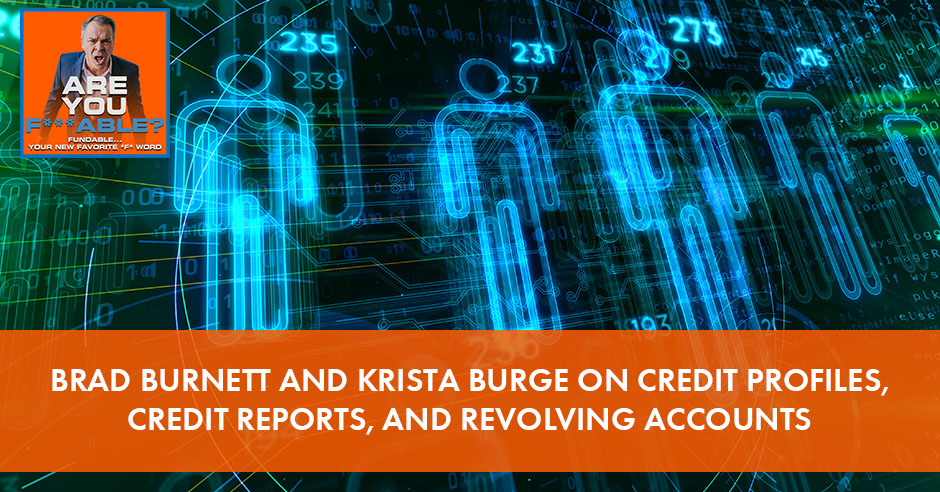
The more fundable you are, the more affable you are. In this episode, Merrill Chandler is joined by business strategist Brad Burnett and real estate coach Krista Burge to discuss what it takes to be more fundable, how to maneuver and navigate revolving accounts, and many more topics related to building your credit profile. Don’t miss this exciting Facebook Live Q &A episode to learn how you can ask the right questions about your credit profile and to understand the source of credit reports such as your monitoring service.
—
Watch the episode here:
Listen to the podcast here:
Brad Burnett And Krista Burge on Credit Profiles, Credit Reports, And Revolving Accounts
In this episode, we’re going to drop right into another Facebook Live question and answer. Do not miss this episode because this is real life people who have joined Facebook. Many of our clients are asking real questions about how to maneuver and navigate these revolving accounts. The balances and the limits, he charges the policies and procedures. We answer so many good questions and this is not just me ranting on a subject, but taking the time to answer questions like you may have for yourself. Stick with me and we’ll drop right into the Q&A words where it’s Brad, Merrill and Krista.
—
We’re going to cover some things that we didn’t get to that we thought were important because it changes your views on how you deal with credit, how you deal with money, interest and things like that.
As we get started, if you have any questions that come up, fire in and we will answer them. We’ll answer as we go and keep the conversation going. One of the first questions that came up for some of the people we were talking with was balances and paying minimums. There are a misconception and a widely held belief and a lot of people who teach this that you should never carry balances on your credit cards. That’s bad because if you think about it, the very nature of this game is showing that you know how to effectively manage other people’s money. If you’re continually running and having zero balance report, you’re in a position where actual components of the final algorithm cannot score you and measure your risk. You end up hurting yourself. You’ve limited yourself on what your true fundability™ is by not having a balance report.
You don’t want to have a big balance report. Without using any names, the instruction we were given is that when it comes to revolving accounts, less is better than more, but some are better than none. It’s one of the things that Merrill teaches and I think it’s brilliant. What Merrill has taught is that interest is the thank you that you paid creditors and lenders for giving you the credit, for letting you use their money and for believing in you. Zero balances are a no-go, but you also got to be careful that you’re not running up big balances also. When you work with us, we teach you exactly how to find out the timing of things so that you’re not accidentally having a balance reports of over 50% and all of a sudden, you watch your score to drop 40 points. Those are the things you need to be aware of. Keep in mind that you’ve got to have a little bit of a balance because if you don’t, you end up hurting yourself at the end of the day.
The other feature of carrying balances besides letting them know that you know how to manage, that once you establish a relationship with them, you’re paying balances or you’re paying your debts faithfully. Think of your credit. I would say your credit is your single greatest financial asset. Most of us, however, keep our credit over the profit and loss. Think of your financials, you give to a bank or whatever, there are a profit and loss statement, your income and expenses and then you’ve got your assets, your balance sheet. Most of us treat credit as though it belongs to our P&L. You treat it like, “Interest is costing us too much money. I’m paying the interest. That’s a bad thing. I don’t want to do interest. I don’t want to pay interest.”
When you end up knowing how to optimize your credit profile and you know how to leverage your financial reputation, that’s on a credit report and credit profile. You want it to be on your balance sheet. You want it to be on your statement that says, “I know how to manage assets.” Here’s a perfect example. Let’s say you had $1 million in gold bullion. Would you spend money protecting that asset? Would you buy security? Would you pay to put it into a locker? You would spend money to protect that asset. That’s exactly what interest is. We want to spend a little bit of intelligent money called interest. We want you to spend that money protecting and building that asset. Do not put it on your P&L. “I got to protect my interest. I’m spending too much money on interest.” That’s why these zero balances are not going to create the same kind of influence with future lenders and underwriters because you’re not managing anything. We don’t want to get you in debt, but we do want strategic debt that is going to create this message to lenders that you’re not going to know how to manage it, but you’re investing in your asset we call your credit profile.
Krista has joined us. She is an advisor of Team One Team Lead. Why don’t you start it out about authorized users? What are your thoughts?
I think a lot of people out there are under the impression that authorized user cards are great for building credit especially if they’ve been through bankruptcy. If they’ve got some serious derogatory accounts or don’t have much credit history. They think that being an authorized user on their parent’s card, on their spouse’s card, whoever it might be, is a great way to develop credit. The way that FICO looks at authorized user cards and the way that underwriters and banks look at those cards is pretty insignificant in comparison to individual user cards. They can only hurt you because if the main user on the card charges up the card and maxes it out or if they don’t make their payment, that’s going to negatively impact you and impact your score.
FICO said that it doesn’t benefit you anything, but if they go late because you’re associated with it, it’s guilt by association and it will change your score. Even though you don’t get positive points, it will get you if they do negative points.
Even if you and that other person are paying everything off responsibly, you’re still only getting a smaller amount of points. You are not getting what you could be getting if you had a strong part in or if you’re the individual user on that account.
Have a little bit of a balance because if you don't, you end up hurting yourself at the end of the day #GetFundable Share on XTo add it a little bit more to that. As you look at how the authorized user lends, there’s going to be a lot of information out there that is terrible misinformation. I watched a video about a guy and his secret to getting your credit score to jump 50 or 60 points in 30 days and it was getting authorized user card. Is this possible? I watched his last video and he did lie because your points are your scoreboard. Your points aren’t your approval. It’s not your profile. If your goal is, “I want to get that first credit card in my hands,” a bunch of authorized user cards can help you. Here’s the downfall. At some point when you want to have a home loan or if you work with us and come in and you want business lines and credit, you’re done because you’ve got your mom’s authorized user card on your profile that’s twenty or ten years or whatever it is. Then you’ve got your $300, $1,000, $5,000 card that you got through that approval and you go to a real underwriter. When they look at that profile and they’ll go, “The Amex isn’t yours. The Chase isn’t yours. The Wells Fargo isn’t yours.”
You’ve got the Local Credit Union for $1,000 and that is yours.
They completely discount all of the other trade lines because they’re not your reputation. Even if it’s stellar, it’s not your reputation. What happens is you get in and you have these authorized users. There’s going to be a point in time when you want them off your profile. When you do that, you will watch your profile tank. Could you leave them in there forever? Theoretically, yes but you’re not going to be fundable. Let me just qualify this. If you don’t want to go out and get approved for home loans or if you don’t want to get business lines of credit like our main constituency of clients, our main focus. They come in and that is what they want. If that’s not your game, if you’re about, “I want to have a car. I want to have a few credit cards. I want to go to Europe on points,” you could have that profile and it can sit there forever. It’s not going to hurt you, but if you want to be an actual leveraged borrower, you don’t want those on your profile.
While we each speak, we’re all shaking our heads. We are shaming and making fun of people who have done this. The intention is not to make fun of you. If you’re in that situation or you’ve listened to other people online or gone to Credit Karma and received information from other sources. That’s not our point. The point is, people come into us all the time. We have hundreds of clients who came in, who are barely keeping their heads above water when it comes to believing that they’re fundable, “I’ve got an 810 credit score. I’ve got a 760 credit score.” You have been deceived that your score is more important than your fundability™ or your profile and as Brad said, that’s what the authorized user will allow you to do. You will raise your score. The score, in that case, is meaningless when it comes to your fundability™.
We’re not making fun of you if you believe somebody else. Just know that we have a steep hill to climb to balance out your score that’s based on authorized user cards when you want to be fundable. You want to get a mortgage. You want to get business lines of credit. We have got to switch this so that your profile is going to show that you’ve been responsible. You’ll say, “I’ve got five years’ worth of credit and it’s 5 to 10 years’ worth of somebody else’s credit.” You need a minimum of 24 months of your own credit to get anything sizeable when it comes to business lines of credit or significant loan that you’re not buying FHA, where the government’s doing all the heavy lifting for you.
If you want something that’s going to be a powerful profile, you’ve got to build your credit profile based on your results in your accounts. We have an algorithm that will slowly diminish the contribution of those authorized user points, but we can’t go close to all of them at the same time. We’re not telling you they’re bad, so go close it. If your score is based on them, you got to keep them. If you’re with us, we’re going to replace those points with individually based accounts where you’re getting the juice for making all the payments and will slowly lower or get rid of the authorized user accounts as we replace those points.
I was going to say, be careful if you have an authorized user card to not run out and close it because it absolutely could be contributing to the average age of your entire revolving accounts portfolio. If that card itself has surpassed 24 months of aging, then it certainly has received some level of FICO bonus points for having it surpassed that aging threshold.
I’m glad you’re here. You have so much to contribute. This is why she is an advisor of Team One’s Team Lead. She is a genius. She’s coaching and training her entire team. If you guys were a part of Advisor Team One, you have got the best of the best.
If you’re not, don’t feel bad. Everyone else is good too.

Revolving Accounts: Interest is the “thank you” that you pay creditors and lenders for giving you the credit and for letting you use their money.
I’m celebrating the fact that we have geniuses as team leaders.
You bring up a great point, Krista. I could probably count 20 or 30 stories of people who heard a presentation where we talked about authorized users and we used to put those on a closure schedule but we do that strategically. We know exactly the contribution that this particular trademark is bringing to your profile before we even touch it. When we have somebody who calls us upset because their score dropped 30 or 40 points, “You said close off authorized users.” We didn’t say close yours. Be very careful because we have seen that. The worst was a three-month-old account with a 30-point drop. Keep in mind that 30-point is tough to gain back, but it’s also part of their fundability™ overall. The score doesn’t matter but don’t close them unless you talk to us and we can give you some real insight into that.
I want to go back. We have talked about not making minimum payments. By the way, we’re reannouncing it. I’m happy that you’ll hear it every single time we talk. In April, we’re going back to FICO. We’re going back for even more of the juice. FICO and their contact because every organization has those specified contacts, they’ve already asked us who we want to meet with and we look at the subject matter because we get consultations while we’re back there, like we did last time. We’re already looking for the business, the liquid credit score to be able to talk about business credit, underwriting and etc. We’re excited about FICO.
The last time we went, one of the things that they told us and one of the things that we intuited that we wanted further clarification in 1 of our 100 questions, was what is the relationship between making minimum payments? This is our intuition. They didn’t tell us the exact number that they’re counting. The message you send when you make two to three minimum payments are, this is all I can afford. They withdraw credit profile points because you’re on “subsistence mode.” Do not make the same payment, even if it’s above and beyond a subsistence. Let’s say your minimum payment is $79. You’re carrying a balance on $2,000 but you can’t draw down fast enough. You can’t get to that perfect balance that we will calculate for you.
Every single account has a perfect balance to carry. Some it will be $17, some it will be $90. We will help you understand how that works. The bottom line is if $79 is the minimum, make $85, $92 or $106. You don’t want it to always be $82, $82, $82 or $85 because of the message is that’s all you can afford. FICO will pull the points back. The fundability™ drops when you send the message as, “This is all I can afford.” Vary the amount like, “I’m throwing some extra cash at my account even though it’s not $200, $300 and $500 at that time.” Do not make it the minimum payment and do not make it the non-minimum payment but make it the same. What would it change it up? Make it different every time. If you can afford $151 one time and back down to $85 on that $79 minimum, do it because the algorithm is looking for a pattern. We do not want to give them a pattern and they’ll give us the points back or let us maintain the points.
To add to that one last piece, why do we spend so much time talking about these little components of what seems to be maybe insignificant? “I’m going to pay my minimum, that should be good enough.” We know people personally who have been denied and the reason for the denial is you’ve been making minimum payments.
That’s one of the 40 characteristics they measure. One of them is what are the payments that you’re making? They will look for minimum payments. You don’t have to believe us, but try it out yourself.
FICO was all about predictive analytics. Do they want to be able to predict exactly what this consumer is like? What is their behavior? If you’re doing the same behavior over and over, whether that’s good or bad, they’re going to know that and reflect that in your score. That’s the idea behind changing off the balance or changing payment beyond the minimum.
The next big topic is Credit Karma.
The intelligence of your questions begets the intelligence of the answers #GetFundable Share on XWe laughed about Credit Karma because it’s the elephant in the room. Everybody has compared their credit scores from Credit Karma. Credit Karma uses a FAKO score. They use the VantageScore which basically started from a D- to an A+. It went from 990 to 550 and they couldn’t get any traction. It’s developed by the three credit bureaus to compete against myFICO. They have been doing this for literally 70 years and there’s no chance in hell that they’re going to trump it. They started out on this 990 to 550. They want to make it like grades, A through D. Lately, they revamped their whole score to go from the 350 to the 850 which is exactly FICO’s version.
If you can’t beat them, join them at least on how they measure. Now, VantageScore and FICO scores have similar score valuations but that’s where the deceptive part is. It’s because VantageScore isn’t used by lenders. You got to go and find out what your score is that the lender is going to use. If you’re working with us, we’re going to develop a profile where the score is meaningful. If you’ve got an 810 credit score and it’s based on a credit union and your Home Depot card, you’re not going to get funded for a mortgage or probably not even a car. The idea is you have to use the score that the lenders are using.
Let’s go back to Credit Karma. Their value is $2 billion on not telling the truth. They are promulgating all of the stories, the misconceptions in the credit myths that your score matters. You walk in and like, “Credit Karma says that I can afford this house or that I can qualify for this house.” Everybody’s celebrating and lead you to believe that it’s going to work. It’s going to mean anything. It’s going to matter. You’re going to go to your mortgage broker and that mortgage broker goes Credit Karma. I’m pulling FICO scores 542.” If you’re our client, you’re going to know what all of that means. Credit Karma, bless their hearts, I love them. We’re going to see that valuation but I’m telling you, you’ve got to ask. Brad taught me one of those brilliant things I’ve lived from every day of my life. The intelligence of your questions begets the intelligence of the answers. If you do not ask smart questions, you will not get smart answers. The better your questions, the better informed you will be.
You have to ask the right questions about your credit profile. You have to ask the right questions about the source of where you’re pulling your credit reports, like your monitoring service. I can list dozens of online services that give out FAKO scores and you think you’re informed but you’re not. FAKO scores measure 10 to 15 of the big criteria. Everybody measures utilization, but they don’t measure the subtleties of your authorized users. They don’t measure the subtleties that are going to make you truly fundable in the eyes of an underwriter. We don’t disrespect Credit Karma’s power of influence. We would call them out on a head to head, put us on Dateline or whatever. Let’s talk shop. We call you out, Credit Karma, into a debate. We would take on any one of your people and ask the questions that are salient to and do that publicly in a line, but you do not get to straight-up deceive clients. Your people who are paying you good money to tell them something that is not going to get them funded. You don’t get to anymore. We won’t let you. David and Goliath, whatever you want to call it, we’ve officially issued our challenge.
I will say this because I agree with everything Merrill said. We’ve come from the same camp on this one, but Credit Karma has done a great job of creating awareness. There’s more of social awareness about credit, which has long been a secret, unknown and uncertain thing that we’ve all built from that space. There’s a great awareness there, but it’s misleading. 99% of lenders use FICO. You’re not going to walk in and get a mortgage off of anything other than a FICO score. Merrill mentioned exactly what versions of FICO that’s going to be. If you’re lost in the weeds that you’re going to get it and your scores can be substantially different. We’ve seen as much as 100 points. It’s not uncommon to see 30 to 40-point differences where people walk in thinking they’re going to get approved because they look at Credit Karma and then they pull up FICO score and they’re not approved. They might be approved, but at a much lower rate for a higher interest.
They will approve you for a $20,000 car and not a $40,000 car that you’re shopping for.
“I can get you into this home loan, but you’re not going to get into 4.3% or 3.9%. It’s going to be 5.6%.” The cost of that is staggering. It’s not right.
While I can be an arrogant ass about what we know or how we portray this, I just want social responsibility. If you have influence, us or anybody, if you have this much influence then tell the truth so the people can count on it. That’s what you deserve. To be in business, you have to have a social responsibility. There’s no harm, no foul in. Why don’t you use FICO then abandon ship? A credit card is the largest single user of VantageScore because nobody else of any worth with consortium of three credit bureaus, who dominated this market for way too long. FICO is the balance of power that says, “We’re going to use the data and we’re going to score it, but we’re not going to be a part of the three credit bureau. Be socially responsible to teach the truth, allow access to the truth and we will be your greatest champion because it is social awareness. It is creating awareness and we don’t want to be the only voices out here, but so far we are. The challenge has been issued.
Are there any questions, comments or thoughts? Those are all the questions I have.

Revolving Accounts: If you’re doing the same behavior over and over, whether that’s good or bad, FICO is going to know that and reflect that in your score.
You are not going to get anything but the truth. Thanks for joining us. If you enjoyed this, give us a look. Come and check us on Facebook and YouTube.
Share it with people who need to know your fellow Credit Karma users.
If you’ve got any questions, let us know. Ask us questions under the comments or shoot us an email at [email protected]. We can answer any questions you have and we’re happy to.
Be well and we’ll see you next time.
Important Links:
- myFICO
- [email protected]
- Facebook – Get Fundable
- YouTube – Get Fundable
Love the show? Subscribe, rate, review, and share!




